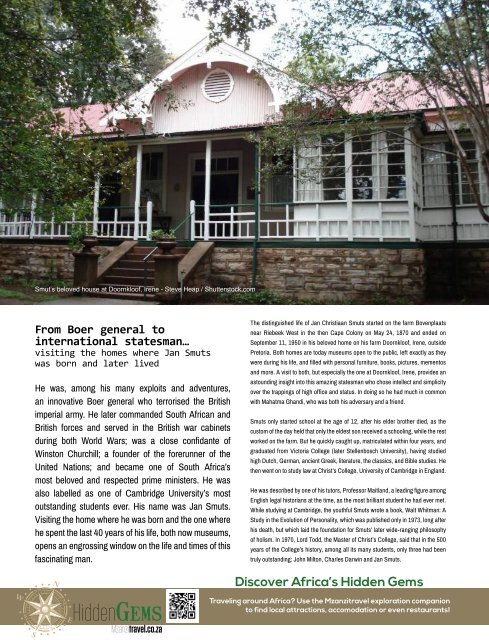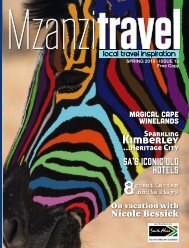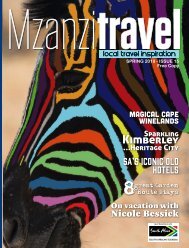Mzanzitravel Magazine - Issue 9
MzanziTravel Magazine is a local travel inspiration for tourists (local and international) to discover the best places to visit in Africa.
MzanziTravel Magazine is a local travel inspiration for tourists (local and international) to discover the best places to visit in Africa.
You also want an ePaper? Increase the reach of your titles
YUMPU automatically turns print PDFs into web optimized ePapers that Google loves.
Hiking<br />
Smut’s beloved house at Doornkloof, Irene - Steve Heap / Shutterstock.com<br />
From Boer general to<br />
international statesman…<br />
visiting the homes where Jan Smuts<br />
was born and later lived<br />
He was, among his many exploits and adventures,<br />
an innovative Boer general who terrorised the British<br />
imperial army. He later commanded South African and<br />
British forces and served in the British war cabinets<br />
during both World Wars; was a close confidante of<br />
Winston Churchill; a founder of the forerunner of the<br />
United Nations; and became one of South Africa’s<br />
most beloved and respected prime ministers. He was<br />
also labelled as one of Cambridge University’s most<br />
outstanding students ever. His name was Jan Smuts.<br />
Visiting the home where he was born and the one where<br />
he spent the last 40 years of his life, both now museums,<br />
opens an engrossing window on the life and times of this<br />
fascinating man.<br />
The distinguished life of Jan Christiaan Smuts started on the farm Bovenplaats<br />
near Riebeek West in the then Cape Colony on May 24, 1870 and ended on<br />
September 11, 1950 in his beloved home on his farm Doornkloof, Irene, outside<br />
Pretoria. Both homes are today museums open to the public, left exactly as they<br />
were during his life, and filled with personal furniture, books, pictures, mementos<br />
and more. A visit to both, but especially the one at Doornkloof, Irene, provides an<br />
astounding insight into this amazing statesman who chose intellect and simplicity<br />
over the trappings of high office and status. In doing so he had much in common<br />
with Mahatma Ghandi, who was both his adversary and a friend.<br />
Smuts only started school at the age of 12, after his elder brother died, as the<br />
custom of the day held that only the eldest son received a schooling, while the rest<br />
worked on the farm. But he quickly caught up, matriculated within four years, and<br />
graduated from Victoria College (later Stellenbosch University), having studied<br />
high Dutch, German, ancient Greek, literature, the classics, and Bible studies. He<br />
then went on to study law at Christ’s College, University of Cambridge in England.<br />
He was described by one of his tutors, Professor Maitland, a leading figure among<br />
English legal historians at the time, as the most brilliant student he had ever met.<br />
While studying at Cambridge, the youthful Smuts wrote a book, Walt Whitman: A<br />
Study in the Evolution of Personality, which was published only in 1973, long after<br />
his death, but which laid the foundation for Smuts’ later wide-ranging philosophy<br />
of holism. In 1970, Lord Todd, the Master of Christ’s College, said that in the 500<br />
years of the College’s history, among all its many students, only three had been<br />
truly outstanding: John Milton, Charles Darwin and Jan Smuts.<br />
Discover Africa’s Hidden Gems<br />
Traveling around Africa? Use the <strong>Mzanzitravel</strong> exploration companion<br />
to find local attractions, accomodation or even restaurants!<br />
<strong>Mzanzitravel</strong>.co.za

















